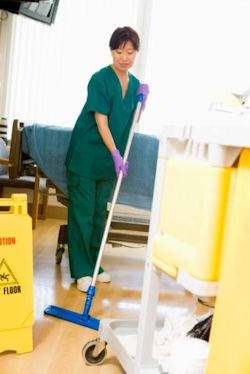Using Hand Tools in Maintenance Areas
To decrease ergonomic stressors when performing cleaning tasks, employees should:
- Alternate leading hand.

Alternate the leading hand while performing cleaning tasks.
- Avoid tight and static grip and use padded non-slip handles.
- Clean objects at waist level if possible, rather than bending over them (e.g., push wheelchairs up a ramped platform to perform cleaning work, or raise beds to waist level before cleaning).
- Use knee pads when kneeling.
- Use tools with extended handles, or use step stools or ladders to avoid or limit overhead reaching.
- When sweeping or dusting, use flat head dusters and push with the leading edge; sweep all areas into one pile and pick up with a vacuum.
- Use chemical cleaners and soaks to minimize force needed for scrubbing.
- Frequently change mopping styles when mopping (e.g., push/pull, and rocking side to side) to alternate stress on muscles.
- Be sure buckets, vacuums, and other cleaning tools, have wheels or are on wheeled containers with functional brakes.
- Alternate tasks or rotate employees through stressful tasks.
- Avoid awkward postures while cleaning (e.g. twisting and bending).
- Use carts to transport supplies rather than carrying.
- Use buffers and vacuums that have lightweight construction and adjustable handle heights.
- Use spray bottles and equipment that have trigger bars rather than single finger triggers.
Knowledge Check Choose the best answer for the question.
2-9. Which of the following is a safe work practice to decrease ergonomic stressors when performing cleaning tasks?
You forgot to answer the question!
